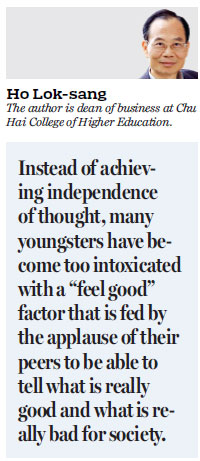Fears of 'brainwashing' lead to bigoted students
Updated: 2018-01-30 06:48
By Ho Lok-sang(HK Edition)
|
|||||||
In this open letter to Hong Kong's students, Ho Lok-sang urges them to avoid confrontational, 'Occupy' stance and becoming cyberbullies
I was a student at the University of Hong Kong more than four decades ago. Like many of you, I was concerned about social injustice and "holes in the system". But unlike you, few of us at the time questioned the political system. We simply took that for granted. But we were concerned about Chinese not being an official language in the government, poor living conditions in squatter settlements, pollution problems, traffic problems, and housing problems. I was a member of the Current Affairs Committee under the HKU Students' Union, joined the student union newspaper Undergrad as a reporter, and took up the role of publication secretary in the Social Sciences Society. In that capacity I was responsible for at least two publications, The Voice (first a magazine, then turned into a newspaper), and the Social Scientist (an annual journal). I was very pleased that I did not have to attend too many hours of lectures. In contrast, today your time table is packed with classes. I found the availability of much free time a great advantage to my intellectual development. I could spend hours in the library, take part in various activities, write on any subject that had sparked my curiosity. I was among the first to have read John Rawls' A Theory of Justice, which was published in 1971. I took delight in The Sea Around Us by Rachel Carson, and thoroughly enjoyed the prose of Robert Heilbroner's The Worldly Philosophers. My university years opened my eyes to the world of philosophy, politics, public policy and the role of institutions.

I do not blame you for not reading nearly as much as I did. You have more courses to take than I, and you have more classes to attend. I also know that your language proficiency is generally not as good - for all kinds of reasons. This would discourage you to read, because reading certainly will have to take far bigger effort.
Yet I believe you also have many advantages over me during my university days. You have access to 21st century information technology and particularly the internet. This can help you learn a language much easier than I could, and get information about virtually any subject superfast. But exactly because of this, it is even more important to maintain humility and an open mind.
In the months leading to the "Occupy" demonstrations, I tried and tried to convey the message to you that civility and cool-headedness must prevail if you want to achieve democracy. In a meeting on political reform back in 2013 at the City University of Hong Kong, I explained that I myself hoped that threshold for one to gain nomination as a candidate for the chief executive post would be as low as possible, and that to do this all stakeholders must not increase Beijing's worries by threatening Beijing with "Occupy" or other uncivil behavior. I was booed. I had warned that such behavior would only increase Beijing's worries and thus prompt the central government to tighten the rules. I had exchanged views with Benny Tai Yiu-ting many times, telling him that his plea for "civil disobedience" would not work, and would be like a slippery slope that could lead to erosion of law and order.
However, the young mind in you pushed you to opt for actions that please yourselves in the short term rather than actions that lead to intended results over the long term. You are attracted to friends who share your feelings and thoughts and despise those who happen not to agree with you. This process of mutual reinforcement has led to polarization of views and often cyberbullying. Cyberbullying repeated over and over again has led to the thoughtless use of abusive language in real life. How else can we explain the use of malicious, abusive language against people they do not like or disagree with? How else can we explain the "occupy" of the language center at the Baptist University, just because too many students failed the test needed to be exempted from enrolling in Putonghua class?
For once many youngsters thought strong massive protests maintained long enough would lead to success, as with the "national education" issue in 2012. After students and other supporters besieged government headquarters for 10 days, the special administrative region government finally gave in, and no longer demanded mandatory inclusion of national education in the school curriculum, which you maintained was a form of "brainwashing".
Actually, this aversion to "brainwashing" has regrettably and unknowingly degraded into arrogance. Instead of achieving independence of thought, many youngsters have become too intoxicated with a "feel good" factor that is fed by the applause of their peers to be able to tell what is really good and what is really bad for society. Wary of being brainwashed, many have chosen the path of narrow-mindedness and bigotry.
Actually, to be useful, our brains do need to be programmed one way or the other. You can call this brainwashing if you like. But you should be open-minded and be the judge over what you install. With wisdom you would install the programs that will prove helpful to you and to society over the long run.
(HK Edition 01/30/2018 page7)